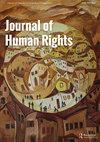Naming and shaming, government messaging, and backlash effects: Experimental evidence from the Convention Against Torture
IF 1.6
2区 社会学
Q3 INTERNATIONAL RELATIONS
引用次数: 2
Abstract
Abstract Conventional thinking proposes that naming and shaming pushes publics to oppose government policies that are claimed to violate human rights. We explore the extent to which international organizations’ (IOs’) efforts to name and shame target governments can be frustrated by the target governments’ efforts to advance a counter-narrative. We test this using a survey-based experiment that focuses on the use of prolonged solitary confinement in US prisons. The results suggest that government messaging has powerful effects on public opinion. These effects are more readily discernible than the effects of IO signals. We also find some limited evidence to suggest that messages from international nongovernmental organizations can, by themselves, elicit a backlash among the respondents. Surprisingly, we found similar effects among both Democrats and Republicans. This demonstrates important limitations to IOs’ naming and shaming tactics.点名和羞辱、政府信息和反弹效应:来自《禁止酷刑公约》的实验证据
传统思想认为,点名羞辱会促使公众反对政府声称侵犯人权的政策。我们探讨了国际组织点名羞辱目标政府的努力在多大程度上会因目标政府提出反叙事的努力而受挫。我们使用一项基于调查的实验来测试这一点,该实验侧重于美国监狱中长期单独监禁的使用。研究结果表明,政府信息对公众舆论有着强大的影响。这些影响比IO信号的影响更容易辨别。我们还发现一些有限的证据表明,来自国际非政府组织的信息本身可能会引起受访者的强烈反对。令人惊讶的是,我们在民主党和共和党中都发现了类似的效果。这表明了IO的点名羞辱策略的重要局限性。
本文章由计算机程序翻译,如有差异,请以英文原文为准。
求助全文
约1分钟内获得全文
求助全文

 求助内容:
求助内容: 应助结果提醒方式:
应助结果提醒方式:


